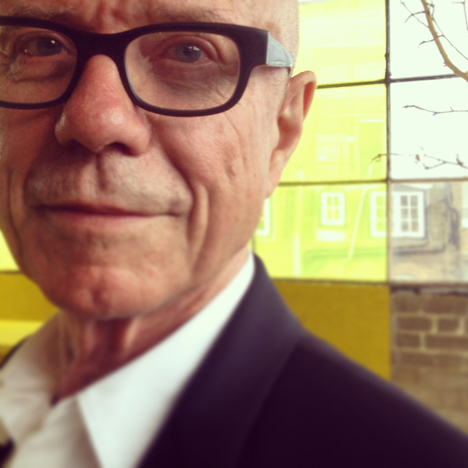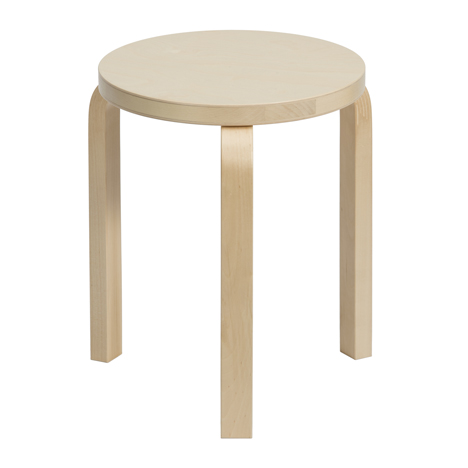
"All the design companies together make 10% of what Ikea makes," says Vitra's Rolf Fehlbaum

News: design brands need to remain small to succeed and need "a romantic person" at the helm, according to Vitra owner and board director Rolf Fehlbaum (+ interview).
"As a design company leader you are a romantic person because you believe you can do things for the world through design, which to an outsider sounds completely ridiculous," said Fehlbaum. "But we believe it."
"That’s also a danger," he added, "because some of these people are too enthusiastic and the business doesn't work. The balance between business and fulfilling your dreams is sometimes difficult."
Fehlbaum, the former Chairman of the Swiss furniture brand, spoke to Dezeen at Clerkenwell Design Week, where he discussed the future of design with Design Museum director Deyan Sudjic and designer Patricia Urquiola.
"All the design companies together make 10% of what Ikea makes," said Fehlbaum during the discussion, emphasising the tiny scale of the design industry.
Last year Vitra acquired Artek, the furniture brand founded in 1935 by Finnish architect and designer Alvar Aalto, and Fehlbaum revealed that the deal had more to do with his long-standing love for Aalto's work than strict business principles.

"I have been in love with Aalto from a long, long time ago," he said. "I never was interested in buying a company. Artek was the one exception."
Vitra, a family-owned company, was founded by Fehlbaum's parents Willi and Erika Fehlbaum in 1957. Fehlbaum took over day-to-day management of the company in 1977 but has recently stepped back. His niece, Nora Fehlbaum, is preparing to take the reins of the brand.
The issue of succession in family-owned companies has led to many failures in the design industry, Fehlbaum said.
"When the family is no longer interested or it isn’t working then [the company] gets sold," Fehlbaum said. "Then the consolidation is rather unfortunate for the world of design because in the end a design company work best when it's relatively small, when it's very personal, when there is somebody leading the company who is crazy about design, loves it and wants to do nothing else."
Here’s the transcript from our interview with Fehlbaum:
Marcus Fairs: What are the forces changing the way furniture is made and sold these days?
Rolf Fehlbaum: The biggest problem is distribution. The smaller companies have problems with distribution. The other problem is that many of the companies are family businesses, which is great for a design company as long as it works. But when the family is no longer interested or it isn’t working then it gets sold. Then the consolidation is rather unfortunate for the world of design because in the end a design company work best when it’s relatively small, when it’s very personal, when there is somebody leading the company who is crazy about design, loves it and wants to do nothing else.
Of course that’s also a danger, because some of these people are too enthusiastic and the business doesn’t work. But it’s a pity when fewer and fewer companies are available. Also in the US: of course there are great companies like Knoll and Herman Miller but for the emerging talent to find a partner is very, very difficult. For design it would be better if there were more independent companies. I’ve seen many, many design companies disappear over the last 40 years, becoming part of a larger entity. It’s a fact of capitalism that concentration takes place.
Marcus Fairs: A lot of the Italian family-owned brands have run into trouble lately. Is that due to their ownership structure or is it down to wider forces?
Rolf Fehlbaum: There are examples of generation changes that work very well. For example Flos, which is a fantastic company with a very good leader [Piero Gandini] following his father [Sergio Gandini]. But there are other examples, like Cassina, where it didn’t work. It’s a great pity because Cassina was a fabulous company.
Then there’s Cappellini. I admire greatly what [Giulio Cappellini] did. He’s a fantastic person, but obviously the business side didn’t work. But obviously the inspiration he was for the design world was fantastic.
So it’s not easy to bring these two worlds together. As a design company leader you are a romantic person because you believe you can do things for the world through design, which to an outsider sounds completely ridiculous. But we believe it. But you can be taken away by that. The balance between business and fulfilling your dreams is sometimes difficult.
Marcus Fairs: How do you ensure that Vitra survives?
Rolf Fehlbaum: One is never sure. It stays a family business. My niece [Nora Fehlbaum] entered the business a couple of years ago and she takes a growing role. I’m around to help but she is going to be in charge and I’m very optimistic. She has the same passion. As a family we want the company to be a project, not just a business. So I think the conditions are good, but you can never be sure.
Marcus Fairs: Why has Vitra continued to grow when so many other furniture design companies have struggled?
Rolf Fehlbaum: In comparison to companies like Steelcase we are a much, much smaller company. But compared to some of the others maybe we have the critical mass. I think it’s a combination of believing in design, working in design, working with designers in a very personal way and at the same time being very careful that the business side works. I was also very lucky having a brother [Vitra co-owner Raymond Fehlbaum] who was actually a much better businessman than I am and has been with me all these years. We never did things we couldn’t afford.
Marcus Fairs: Tell me about the deal with Artek.
Rolf Fehlbaum: I have been in love with Aalto from a long, long time ago. When I started collecting in the eighties my key figures were Eames, Nelson, Aalto and Prouvé. I always thought it would be great to represent Prouvé and Aalto one day. And then Prouvé became possible around 2000, when we got the rights to Prouvé. And when I heard the owner of Artek – which was a Swedish investment bank, Proventus – was interested in selling after 20 years I was reminded that 20 years ago I had already asked that if they one day wanted to sell I would be interested.
And now we are together and it’s a really interesting balance to use Vitra’s strengths but also keep the independence. That’s a really difficult act. We’re working on that now.
Marcus Fairs: Will there be more acquisitions?
Rolf Fehlbaum: No. I never was interested in buying a company. Artek was the one exception. Artek is also a project; it’s not just a company. It was founded in 1935 by Aalto and his wife [Aino Aalto, together with art promoter Maire Gullichsen and art historian Nils-Gustav Hahl] and they had from the beginning the idea – yes it was about production but it was also a cultural project. That is what I’m interested in. And it’s different from Vitra, but complimentary. But we are not at all interested in buying other companies. We have a certain identity and we don't want to change that.